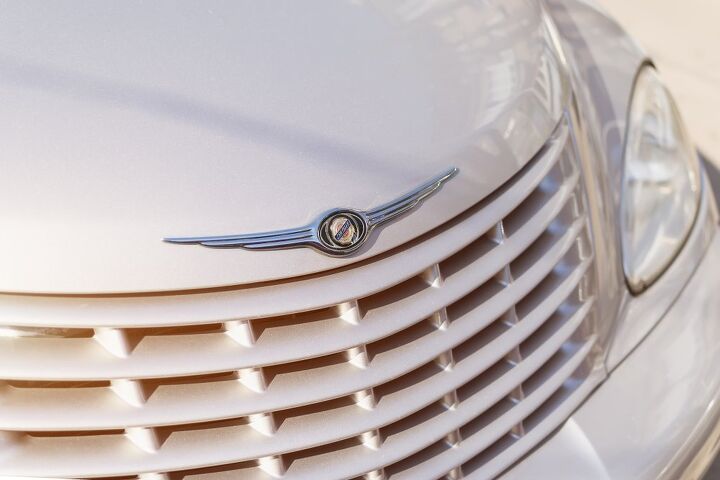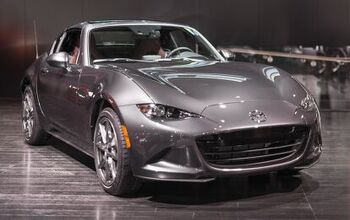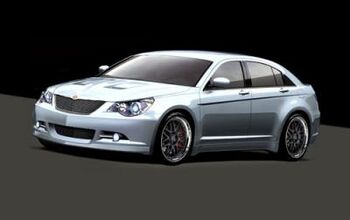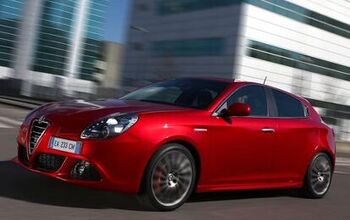What's to Become of Chrysler?

Chrysler has certainly changed since emerging from the ashes of the Maxwell Motor Company in 1925, spending the better part of the 20th century purveying all manner of car to the American public. The current century has seen the company merge with Daimler, followed by Fiat. Now it’s cozying up to PSA Group, leaving many to wonder what purpose Chrysler serves beyond being the corporate namesake.
Officially, the merger isn’t supposed to impact any FCA or PSA brands. But the Chrysler brand isn’t exactly a model of industrial health. Its current lineup consists of four vehicles, one of which (Voyager) is just the lower-trim version of the non-hybrid Pacifica. The minivan sales are enviable, comprising over half of all vehicles sold within the segment for the United States last year — if you incorporate the Dodge Caravan — but Chrysler’s overall trajectory leaves much to be desired.
Here’s how FCA envisioned things — each auto brand would cater to a specific section of the market to provide complete coverage. But market realities put too much pressure on some of them.
Fiat’s penchant for small cars made it a novelty when it landed in the U.S. market, and it garnered some extra attention from those seeking a small car in the wake of the Great Recession. Unfortunately, Americans had already begun shifting toward larger crossover vehicles. The brand’s U.S. deliveries peaked at 46,121 units in 2014. By 2018 Fiat couldn’t even sell 16,000 — despite moving nearly 700,000 vehicles in Europe that same year.
Chrysler’s path, while a little different, is similarly bleak. Immediately before the recession, the brand could reliably sell about 500,000 cars inside the U.S. each year. By 2018, that figure had dwindled to just 165,964 units, mainly the result of minivans falling completely out of fashion.
The Detroit News claims this doesn’t bode well for the brand, regardless of what factory executives say. The FCA-PSA merger will result in an entity with 13 individual brands, which is more than any other global automaker. It’s going to be tough to manage, especially if PSA is interested in shipping French product our way.
Tim Kuniskis, FCA’s head of passenger cars, told the outlet that minivans could be enough. “No one has ever asked if we’re going to stop selling muscle cars,” he said, adding that the United States buys more minivans overall. Yet minivans aren’t typically passion purchases, meaning Chrysler’s current trajectory should still raise an eyebrow or two. In 2019, brand sales fell by 23 percent vs a one percent sales decline for FCA as a whole. Minivans hung in tougher than the 300 sedan, which saw a 37 percent decline against 2018, but Pacifica sales still dropped by 17 percent (the Voyager was new for 2019).
“This is a division that doesn’t seem to represent a vibrant, healthy product line,” said Karl Brauer, executive publisher for Cox Automotive. “It doesn’t seem to have a bright future. I think for most people under the age of 40, they don’t have much awareness or affinity for that brand.”
Considering PSA’s desire to make a move on the North American market, and Chrysler’s presumed anonymity to people under 40, there’s a fair chance that Chrysler will be used for selling Peugeot (and maybe Citroën/DS) vehicles on our side of the ocean.
From The Detroit News:
Last week, PSA said the CEOs for the Citroën and DS brands were moving into new roles to focus on brand positioning, differentiation and cost savings. PSA matches each of its brands with a competitor whose results it aims to beat, [PSA spokesman Bertrand Blaise] said.
“We have Citroën, which is the people-minded brand,” he said. “Peugeot is the high-end mainstream brand. DS Automobiles is a premium brand with a French flair. Opel is the true German brand, and Vauxhall is a brand for the British. We want to maximize our brand positionings within the group portfolio … [PSA CEO Carlos Tavares] always says, ‘Every brand has its own chance.'”
One bright spot for Chrysler is the number of manufacturers who have abandoned the minivan altogether. Most domestic brand snubbed them long ago to prioritize crossover vehicles, leaving a handful of Asian brands and the Pentastar to fight over a fairly small corner of the auto market they don’t really need to share. “From a company standpoint, there are only four players,” Kuniskis explained. “It’s a good place to be … you’re competing on innovation and having the best product in the marketplace.”
In that respect, Pacifica really is a cut above. But there’s nothing to suggest customers will ever come running back into the minivan’s roomy embrace, even if it feels smarter to hedge your bets. Still, Chrysler could be onto something. Asian manufacturers are beginning to corner the small car segment now that U.S. factories have stopped producing them. While that doesn’t seem to be making much of a difference at present, we’re one fuel crisis away from calling them all economic geniuses. If there’s another baby boom, perhaps minivans will once again grow in popularity.
Cox’s Brauer also suggested that the minivan could be the shape of the future. “The best shape for moving people around is a big box,” he said. “It’s not the coolest or sportiest, but it certainly is the most effective. We’re on the cusp of the minivan becoming a far more viable design for human transportation — just not for the personal buyer model.”
Chrysler already supplies Waymo with Pacifica models for its self-driving endeavors, so this isn’t as insane as it sounds. Of course, it also doesn’t help Chrysler in the short term. FCA is cutting a third shift at Windsor Assembly where its minivans are built. It also doesn’t typically set aside the same kind of development cash for the brand that it would for, say, Dodge or Jeep.
Frank Rhodes Jr., great-grandson of Walter P. Chrysler, told The Detroit News he sent a letter to PSA boss Carlos Tavares and French President Emmanuel Macron in November to request their aid in assuring Chrysler’s future as an American automotive brand. PSA stated that Tavares’ office had not received the letter.
“It deserves to survive,” Rhodes said. “Chrysler has done a lot for this country for almost 100 years. It needs to be preserved. It’s heritage, it’s pride, it’s part of Americana. We’re seeing more and more Americana go away. It’s a shame.”
[Image: Maryia_K/Shutterstock]

A staunch consumer advocate tracking industry trends and regulation. Before joining TTAC, Matt spent a decade working for marketing and research firms based in NYC. Clients included several of the world’s largest automakers, global tire brands, and aftermarket part suppliers. Dissatisfied with the corporate world and resentful of having to wear suits everyday, he pivoted to writing about cars. Since then, that man has become an ardent supporter of the right-to-repair movement, been interviewed on the auto industry by national radio broadcasts, driven more rental cars than anyone ever should, participated in amateur rallying events, and received the requisite minimum training as sanctioned by the SCCA. Handy with a wrench, Matt grew up surrounded by Detroit auto workers and managed to get a pizza delivery job before he was legally eligible. He later found himself driving box trucks through Manhattan, guaranteeing future sympathy for actual truckers. He continues to conduct research pertaining to the automotive sector as an independent contractor and has since moved back to his native Michigan, closer to where the cars are born. A contrarian, Matt claims to prefer understeer — stating that front and all-wheel drive vehicles cater best to his driving style.
More by Matt Posky
Latest Car Reviews
Read moreLatest Product Reviews
Read moreRecent Comments
- ToolGuy Let's count the poor decisions: Honda 18 model years past peak Honda. Ohio. Following too closely ('rock on the highway' doesn't leap up and attack your vehicle by itself, it is riding on a vehicle or thrown up by a vehicle, and you should be alert to this). Ohio. Not enough doors. Choosing to expand family -- in Ohio. 😉
- ToolGuy Took me a minute to post; had to go back and see which account I was using the last time I commented on this topic (consistency is important). Thank you for your patience.
- ToolGuy Ok wow, just wow. I used to live in America. Land of the free -- have I heard that somewhere? And here come TTAC writers and commentariat goose stepping in lockstep, dancing on the grave of liberty. Didn't your dysfunctional homeowners association get all that government overreach out of your system? I thought we won WW2, guess I was mistaken.
- Dartman If one is so hellbent on drawing attention to themselves just mount a big “Trump 2024” or “Black Lives Matter” flag (your choice) on your truck and call it day. Lot cheaper, same result.
- AZFelix I'd buy a 'harlequin' edition if it was composed of a company's complete palette of greys and silver.Family had a couple of Pontiacs in teal and purple in years past. I was not a fan.My current ride is Lakeside Blue.


































Comments
Join the conversation
Make a good product, market it and people will come. Chrysler has been making crap products for a while now. Evaluate them however you want to. Cheap interiors, average performing mass market engines (their V6s that are in most products), bad transmissions (the 200) and a very out of date product line up. Its continued existence doesn't make sense. I'd love to try / maybe even buy one of PSAs other brands. There is no current case for me to go into a Chrysler dealer for any reason and there hasn't been for a long time.
The minivan is the obvious form factor for an EV. Box with a motor, something Elon could dash out in an afternoon like his truck. Watch out, Chrysler. Lead, follow, or get out of the way.